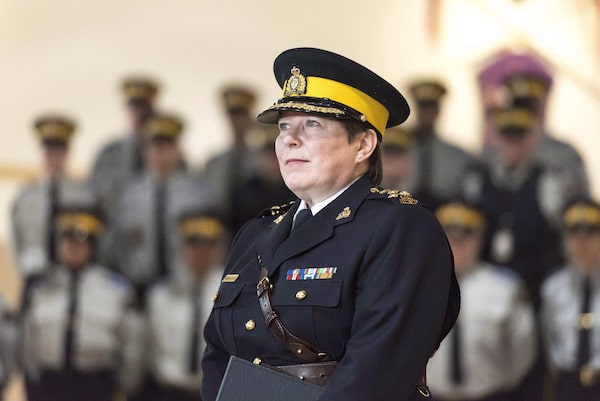
RCMP Commissioner Brenda Lucki speaks during a press event at RCMP 'Depot' Division in Regina in this file photo from March 9, 2018.Michael Bell/The Canadian Press
RCMP Commissioner Brenda Lucki acknowledged the existence of systemic racism in her organization on Tuesday, but was unable to give a specific example that satisfied some of the MPs at an emergency meeting on the problems facing the national police force.
Speaking in front of the public safety committee of the House, Commissioner Lucki said “there’s absolutely systemic racism” in the RCMP.
However, when Liberal MP Greg Fergus asked her for an example, she spoke of a physical evaluation test in which participants in an obstacle course have to do a broad jump over a six-foot mat. She said, upon review, there was evidence to indicate that an average person can jump only their height.
“How many six-foot people do we hire? And there are people in all different cultures that may not be six feet, including there’s not a lot of women that are six feet tall, that would not be able to get through that type of test,” Commissioner Lucki said.
Mr. Fergus, who is the chair of the Black caucus in Parliament, said he was not satisfied by her answer. “That would be systemic discrimination,” he said. “But I’m trying to think of systemic racism.”
In her appearance in front of MPs on Tuesday, Commissioner Lucki referred Mr. Fergus’s question to her chief human resources officer, Gail Johnson, who attended the evening session by video link. Ms. Johnson said systemic racism is understood to apply to systems in organizations that disadvantage certain racialized and Indigenous groups.
Ms. Johnson added that attempts to recruit officers from the North have been hindered because people in remote locations had a difficult time coming to write aptitude tests in person. She said the force now recognizes this disadvantaged that group, adding the RCMP has made it easier to participate in the process from northern locations.
The committee passed a motion to study the issue of systemic racism in policing in Canada. Public Safety Minister Bill Blair and Commissioner Lucki were the first witnesses.
NDP MP Charlie Angus said it is ridiculous for the RCMP Commissioner to cite the example of an obstacle course in response to a question about systemic racism in the force.
“What we need to see action on is the fact that Indigenous people are only four percent of the population but make up 36 percent of the deaths at the hands of the RCMP,” he said.
On June 10, Commissioner Lucki said in an interview with The Globe and Mail that “we don’t have systemic racism” in the force. Prime Minister Justin Trudeau contradicted her the next day, and on June 12, she released a statement acknowledging she was wrong.
Trudeau contradicts Commissioner Lucki over existence of systemic racism in the RCMP
Charges expected to be dropped against First Nations Chief Allan Adam
Liberal MP Gary Anandasangaree said he was disappointed by Commissioner Lucki’s “lack of clarity in acknowledging that systemic racism exists” in the RCMP.
Earlier in the committee hearing, Mr. Blair said there is no doubt systemic racism exists in Canada’s justice system, including in police services, courts and prisons.
“I define systemic racism as deficiencies in the system that give rise to different outcomes for different racial groups,” he said.
Mr. Blair, who is a former Toronto Police chief, promised to make it easier and quicker for Canadians to lodge a complaint against the RCMP. Mr. Blair’s comments came in response to a question about the need to change the process overseen by the Civilian Review and Complaints Commission (CRCC).
In particular, Liberal MP Pam Damoff asked Mr. Blair whether the Liberal government would consider bringing in legislation to set timelines for CRCC investigations to address complaints that they take too long. She also asked whether he is open to simplifying the system to ensure more people can access it, saying many feel they need to hire a lawyer to file a complaint.
“I’m very open to your observations and recommendations coming forward from the work of this committee on how we can make the complaint review system work better, not just for all Canadians, but for police officers who are subjects of these complaints,” Mr. Blair said. “A timely resolution of that complaint is actually in their interest as well, so they can get on with rebuilding their relationship with the people they’re supposed to be serving.”
Mr. Blair also told the committee one of the Liberal government’s priorities is to co-develop a legislative framework that recognizes First Nations policing as an essential service and to ensure the services are culturally appropriate.
The federal government has committed to spend up to $291-million under what is called the First Nations Policing Program. It is designed to support policing services dedicated to First Nation and Inuit communities.
Assembly of First Nations National Chief Perry Bellegarde has been urging Ottawa to declare First Nations policing as essential.
Our Morning Update and Evening Update newsletters are written by Globe editors, giving you a concise summary of the day’s most important headlines. Sign up today.
 Kristy Kirkup
Kristy Kirkup